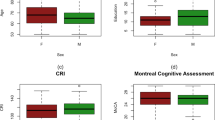Abstract
Objectives
Beyond the well-known effect of educational level on cognitive performances, the present study investigates the specific effect of literacy acquisition independently of education.
Design
A sample of 175 unschooled elderly participants was selected from a larger Mexican population-based cohort study.
Participants
The sample of 175 subjects who never went to school was divided in two groups: 109 who never acquired literacy skills and 66 who declared having acquired reading and writing abilities.
Measurements
Cognitive performances on commonly used tests (Mini mental state examination, Isaacs set test, Free and cued selective reminding test and clock-drawing test) were compared between the two groups taking into account several potentially confounding factors.
Results
The participants with reading and writing skills performed better than their counterparts in most tests, even though no difference was observed for the Isaacs Set Test and the delayed recall of the Free and Cued Selective Reminding Test.
Conclusion
Writing and reading skills in elderly people with no formal education influence performances in very commonly used test. Not only educational level but also literacy acquisition should be taken into account when conducting cognitive assessment in very low educated elderly people.
Similar content being viewed by others
References
Lezak, MD, Howieson, DB, Loring, DW. Neuropsychological Assessment. New York: Oxford University Press, 2004.
Matallana, D, Santacruz, CD, Cano, C et al. The Relationship Between Education Level and Mini-Mental State Examination Domains Among Older Mexican Americans. J Geriatr Psychiatry Neurol 2011; 24(1): 9–18.
Ostrosky-Solis, F, Ardila, A, Rosselli, M et al. Neuropsychological test performance in illiterate subjects. Arch Clin Neuropsychol 1998; 13(7): 645–660.
Welch, LW, Doineau, D, Johnson, S et al. Educational and gender normative data for the Boston Naming Test in a group of older adults. Brain Lang 1996; 53(2): 260–266.
Dellatolas, G, Willadino Braga, L, Souza Ldo, N et al. Cognitive consequences of early phase of literacy. J Int Neuropsychol Soc 2003; 9(5): 771–782.
Byrd, DA, Jacobs, DM, Hilton, HJ et al. Sources of errors on visuoperceptual tasks: role of education, literacy, and search strategy. Brain Cogn 2005; 58(3): 251–257.
Manly, JJ, Jacobs, DM, Touradji, P et al. Reading level attenuates differences in neuropsychological test performance between African American and White elders. J Int Neuropsychol Soc 2002; 8(3): 341–348.
Manly, JJ, Touradji, P, Tang, MX et al. Literacy and memory decline among ethnically diverse elders. J Clin Exp Neuropsychol 2003; 25(5): 680–690.
Ardila, A, Rosselli, M, Rosas, P. Neuropsychological assessment in illiterates: visuospatial and memory abilities. Brain Cogn 1989; 11(2): 147–166.
Folia, V, Kosmidis, MH. Assessment of memory skills in illiterates: strategy differences or test artifact? Clin Neuropsychol 2003; 17(2): 143–152.
Nitrini, R, Caramelli, P, Herrera Junior, E et al. Performance of illiterate and literate nondemented elderly subjects in two tests of long-term memory. J Int Neuropsychol Soc 2004; 10(4): 634–638.
Castro-Caldas, A, Petersson, KM, Reis, A et al. The illiterate brain. Learning to read and write during childhood influences the functional organization of the adult brain. Brain 1998; 121: 1053–1063.
Lecours, AR, Mehler, J, Parente, MA et al. (1987). Illiteracy and brain damage—1. Aphasia testing in culturally contrasted populations (control subjects). Neuropsychologia, 25(1B): 231–245.
Reis, A, Castro-Caldas, A. Illiteracy: a cause for biased cognitive development. J Int Neuropsychol Soc 1997; 3(5): 444–450.
Petersson, KM, Silva, C, Castro-Caldas, A et al. Literacy: a cultural influence on functional left-right differences in the inferior parietal cortex. Eur J Neurosci 2007; 26(3): 791–799.
Castro-Caldas, A, Miranda, PC, Carmo, I et al. Influence of learning to read and write on the morphology of the corpus callosum. Eur J Neurol 1999; 6(1): 23–28.
Manly, JJ, Jacobs, DM, Sano, M et al. Effect of literacy on neuropsychological test performance in nondemented, education-matched elders. J Int Neuropsychol Soc 1999; 5(3): 191–202.
Ardila, A, Ostrosky-Solis, F, Mendoza, VU. Learning to read is much more than learning to read: a neuropsychologically based reading program. J Int Neuropsychol Soc 2000; 6(7): 789–801.
Carreiras, M, Seghier, ML, Baquero, S et al. An anatomical signature for literacy. Nature 2009; 461(7266): 983–986.
Ávila-Funes, JA, Piña-Escudero, ST, Aguilar-Navarro, S et al. Cognitive impairment and low physical activity are the components of frailty more strongly associated with disability. J Nutr Health Aging 2011; 15(8): 683–689.
Folstein, MF, Folstein, SE, McHugh, PR. “Mini-mental state”. A practical method for grading the cognitive state of patients for the clinician. J Psychiatr Res 1975; 12(3): 189–198.
Isaacs, B, Kennie, AT. The Set test as an aid to the detection of dementia in old people. Br J Psychiatry 1973; 123(575): 467–470.
Grober, E, Buschke, H. Genuine memory deficits in dementia. Dev Neuropsychol 1987; 3(1): 13–36.
Shulman, K, Shedletsky, P, Silver, IL. The challenge of time: Clock drawing and cognitive functing in the elderly. Int J Geriatr Psychiat; 1: 135–140.
Sheikh JI, Yesavage JA. Geriatric Depression Scale: recent evidence and development of a shorter version. Clin Gerontol 1986; 5: 165–172.
Amieva, H, Le Goff, M, Millet, X et al. Prodromal Alzheimer’s disease: successive emergence of the clinical symptoms. Ann Neurol 2008; 64(5): 492–498.
Caramelli, P, Carthery-Goulart, MT, Porto, CS et al. Category fluency as a screening test for Alzheimer disease in illiterate and literate patients. Alzheimer Dis Assoc Disord 2007; 21(1): 65–67.
Author information
Authors and Affiliations
Corresponding author
Rights and permissions
About this article
Cite this article
Mokri, H., Ávila-Funes, J.A., Le Goff, M. et al. Self-reported reading and writing skills in elderly who never attended school influence cognitive performances: Results from the coyoacan cohort study. J Nutr Health Aging 16, 621–624 (2012). https://doi.org/10.1007/s12603-012-0070-8
Received:
Accepted:
Published:
Issue Date:
DOI: https://doi.org/10.1007/s12603-012-0070-8




